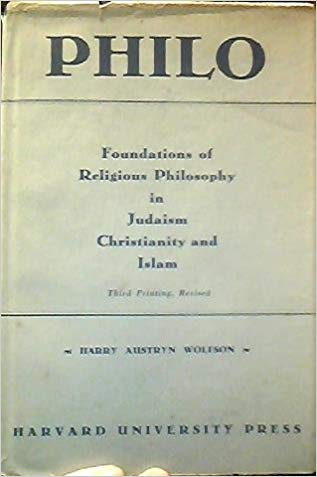File:1947 * Wolfson.jpg
1947_*_Wolfson.jpg (317 × 477 pixels, file size: 18 KB, MIME type: image/jpeg)
Philo: Foundations of Religious Philosophy in Judaism, Christianity, and Islam (1947) is a book by Harry Austryn Wolfson.
Abstract
A seminal work in Philonic studies which has yet to be surpassed in its breadth and scope. This two volume work serves as the second volume in the series “Structure and Growth of Philosophic Systems from Plato to Spinoza,” and was designed to serve as a general prolegomenon to the major problems of religious philosophy for the 17 centuries following Philo. Wolfson is often seen here reacting against traditional scholarship on Philo, where scholars of both philosophy and religious studies had long (and almost universally) considered Philo as unoriginal and nothing more than a footnote in the history of philosophy. Wolfson sets out to see if Philo has a coherent system of his own, and in the end he concludes that in Philo we see the first systematic departure from pagan Greek philosophy. Philo founded this new school of philosophy, with scripture at its core, which would dominate Christian, Jewish, and Islamic philosophy and European thought as a whole for 17 centuries. Only with Spinoza does the movement which Philo began begin to crumble. – Jason Zurawski, University of Michigan
Editions
Published in Cambridge, MA: Harvard University Press, <2 vols.> 1947. Reprinted several times between 1947 and 1982.
Translations
Contents
Volume I
Chapter 1. Hellenistic Judaism and Philo
- A. Hellenistic Jewish Attitude toward Greek Religion and Philosophy
- B. Philo on Polytheism, Mythology, and Mysteries
- C. Discordance, Conformity, Apostasy
Chapter 2. Handmaid of Scripture
- A. Behind the Allegorical Method
- B. The Allegorical Method
- C. Origin of Scripture and Origin of Philosophy
- D. Faith and Reason
- E. Conclusion, Influence, Anticipation
Chapter 3. Scriptural Presuppositions
Chapter 4. God, the World of Ideas, and the Logos
- A. God and the Ideas
- B. Ideas
- C. Powers
- D. The Intelligible World and the Logos
- E. Relations between God, the Logos, and the Ideas
- F. Logos and Wisdom
- G. The Instrumentality of the Logos, Powers, and Wisdom
- H. The Fiction of Intermediaries
- I. Conclusion, Influence, Anticipation
Chapter 5. Creation and Structure of the World
Chapter 6. The Immanent Logos, Laws of Nature, Miracles
- A. Immanent Logos
- B. Laws of Nature
- C. Miracles
- D. Conclusion, Influence, Anticipation
Chapter 7. Souls, Angels, Immortality
- A. Living Beings
- B. Unbodied Souls or Angels
- C. Animals and Irrational Soul of Man
- D. The Rational Soul of Man
- E. Immortality of the Soul
- F. Conclusion, Influence, Anticipation
Chapter 8. Free Will
- A. Miracles and Freedom
- B. The Choice of Good and Evil
- C. Conclusion, Influence, Anticipation
Volume II
Chapter 9. Knowledge and Prophecy
- A. Sensation, Reason, and Prophecy
- B. The Four Functions of Prophecy
- C. The Three Types of Prophecy
- D. Prophetic Dreams
- E. Conclusion, Influence, Anticipation
Chapter 10. Proofs of the Existence of God
Chapter 11. The Unknowability of God and Divine Predicates
- A. Unity, Incorporeality, Simplicity
- B. “Without Quality” - ἂποιος
- C. The Unnamability and Unknowability of God
- D. Divine Properties
- E. The Essence of the Created Powers
- F. Conclusion, Influence, Anticipation
Chapter 12. Ethical Theory
- A. “Under the Law” and “In Accordance with Nature”
- B. Commandments and Virtues
- C. The Virtue of the Control of Desire
- D. Prayer, Repentance, and Study as Virtues
- E. The Definition of Virtue
- F. The Reward of Virtue
- G. Conclusion, Influence, Anticipation
Chapter 13. Political Theory
- A. The Mosaic Constitution
- B. The Ideal Constitution
- C. The Messianic Age
- D. Conclusion, Influence, Anticipation
Chapter 14. What is New in Philo?
External links
File history
Click on a date/time to view the file as it appeared at that time.
| Date/Time | Thumbnail | Dimensions | User | Comment | |
|---|---|---|---|---|---|
| current | 10:06, 24 July 2018 |  | 317 × 477 (18 KB) | Gabriele Boccaccini (talk | contribs) |
You cannot overwrite this file.
File usage
There are no pages that use this file.
